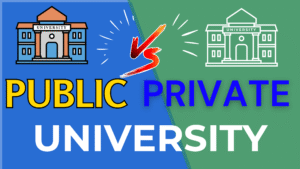It can be overwhelming trying to select the best university, particularly when choosing between a public or a private university. Each option has its own pros and cons.
Public universities are often cheaper, get government support, and charge many international students set rates. Private universities are often more modern, have more up-to-date facilities, and offer programs with varying structures and flexibility so you can have time for work, leisure, and your studies.
In this guide, we provide the real differences between public and private universities so you can choose wisely and make an informed decision based on your needs, wishes, financial means, and the trajectory of your future career path.

Key Differences Between Public and Private Universities
Learning more about one of the key differences between public and private universities helps students make better decisions.
Public universities are less costly and operated by the government, while private universities feature a modern campus, smaller classes to better cultivate learning, and allow students to be taught by professors with years of experience, and programs that will more likely fit students’ learning styles.
Each has its positive aspects, depending on a student’s academic goals, finances, and learning preferences.
Tuition Fee
One of the most apparent differences between public universities and private universities would be tuition fees. Public universities are usually cheaper to attend because, funnily enough, these universities are subsidized by the government, making it a more attainable choice for a majority of students.
Private universities tend to charge more to help maintain a level of modernity in the facilities and services they offer, but this may or may not fit everyone’s budget.
Funding Resources
Admission Criteria
Class Size
In public universities, class size is generally larger, due to increased enrollment and fewer faculty, simply because of the resources available, which complicates the level of individualized attention.
In private university settings, there are generally reduced class sizes allowing for increased engagement, interaction with the course material, personalized feedback on performance, and face time with the students; this is, in fact, something that many students find helpful in their academic development.
Infrastructure
It is often noted that infrastructure in private universities is generally more modern and well-maintained, including labs, libraries, and digital infrastructure.
In the case of public universities, especially those with fewer upgrades due to lesser budgets and, perhaps, bureaucracies, their basic infrastructure is solid, everything else being equal, especially at older public universities with well-established academic reputations, large, multi-generation campuses, and a plethora of different kinds of facilities.
Reputation
Reputation can vary between public and private universities. Public universities usually have established reputations due to the long history of the institutions, research conducted, and graduate success.
While private universities are new, they have built their own quickly growing reputations due to innovative and modern learning, strong international agreements, and support from the private sector, making them an acceptable option for students looking for quality education.
Job Placement
Job placement ratios differ between public and private Universities. University career services tend to work closely with, and have very active industry links within, the private sector.
If a graduate is successful with their own personal job search strategy, they may receive job placement before traditional job searching methods surface; this can mean the difference of obtaining employment earlier with the use of technology as opposed to the old methods of networking, waiting for replies, and using outdated career services or job placement methods.
Universities typically focus on academic rigor, and not “job placement” ratios; thus, programs in Public Universities tend to have fewer structured placement routes, and students will need to rely more on their own networks, or job search externally.
Final Thoughts
FAQS (Frequently Asked Questions)
Q1: Are private universities better than public universities in Pakistan?
Not necessarily – public universities have stronger reputations, but private universities offer modern facilities and flexible programs.
Q2: Which type of university is cheaper?
Public universities tend to be cheaper–due in large part to state funding.
Q3: Do private universities have better job placement?
Many have greater connections to the industry and better career services to help graduates get jobs than public institutions.
Q4: Is the value of diplomas from public universities and private universities different?
No, as long as both are authorized by HEC, the diploma has equal academic value.
Q5: Which university type has better infrastructure?
Private universities are usually newer and embrace technology. Older public universities tend to have worse infrastructure, but those with strong reputations may also be strong in this area.
Share the Article with your friends

